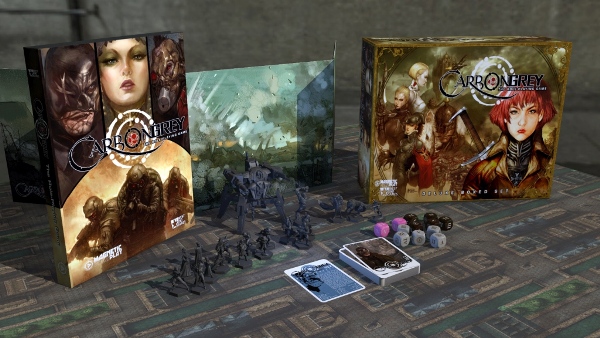Progressive Games: Planning, Part 2
By Cape Rust
Last week we discussed the first part of the planning process for the progressive (prog) game which involved a few of the aspects of collaboration. As you know by now there is no way I could have covered all of those collaboration aspects; and if I had tried, you would have stopped reading after the first few thousand words. This week I am going to focus on character and player focus and I’ll eventually finish up the planning phase of my series on Prog games with flexibility.
I believe that player focus should actually precede character focus; after all it is kind of hard to focus on player characters if you haven’t first properly focused on the players. Running a player centric game is nothing new and many games that are being produced these days are designed to be player centric. Because of the drastic changes that can occur during the course of a Prog game it is important to focus on whatever constants you can as a GM and as a group. Players and player characters are two of the most fundamental constants and are quite worthy of your time and efforts.
By focusing on your players from the very beginning you will build the foundation I have alluded to. Because the Prog game relies on a solid foundation and player buy-in focusing on the players becomes even more vital. Those players and their characters are the one common thread in any Prog game so the focus really should be on them. As you start the planning the most important question to ask is what kind of game do the players want? Do they want a combat heavy, role-playing heavy or mixture of both? Do the players want to start at a high or low level? How much magic will there be in the game?
All of those questions and so many more are vital to the Prog game process. Here is a good example: I have a friend who runs Monty Hall, video game inspired games; resulting in lots of great gear and a series of quests that lead up to boss battles. These types of games are really fun for me, but only for a limited time. If there is frank and open discussion about how everyone feels about this type of game from the start, that friend who will be a fellow player and GM will know if he should adjust his style of running the game or amp it up to meet his peer/player expectations. If the entire gaming group is tired of this style of play and honestly and openly express their true feelings on the matter then the entire Prog game experience will be more enjoyable for everyone involved.
A huge factor in player focus is the ability to not take things personally. As the group discusses what they want from the Prog game, it is vital for everyone to listen and express their wants and desires. If everyone in the group expresses a lack of interest in the type of game you normally run, listen to them. You might be inclined to believe their displeasure is directed at you; often it isn’t personal, the players just want something different. If you take a few steps back you might start to see that their complaints or desire for change is actually motivated by a string of games run by different people in the group rather than a personal attack on you. Remember, just because you might be the first person slated to run a game, it doesn’t mean you don’t have a say in this process. In a few months as a GM, you will step aside and become a player. If you haven’t expressed your desires and are unhappy with the follow-up game, then you lose some of your right to piss, whine and moan about the situation.
This initial player focused planning shouldn’t be the only player focused planning. Every group should take a few strategic pauses to determine if the players are still happy with the game. If the players are unhappy then there is nothing wrong with adjusting the game to meet those player expectations. Because of the very nature of a role-playing game you are not bound by blood or oath to stick to one style of gaming. If something is broken or the players are unhappy, change it. There is no shame in that, in fact the group as a whole will be thankful for it. I have been in some groups that refused to stop and discuss how the game was going after it began, I don’t know if this unwillingness to discuss the game stemmed from GM fear or the “way” it has always been done. No matter what the cause, a truly player focused game should include several discussions on how the game is going from a player standpoint and be flexible enough to adapt to player wants and needs within reason.
If your group gets to a point where player wants are diametrically opposed then player focused planning is a great time to de-conflict these issues. Someone who doesn’t have a dog in that fight should moderate the discussion, but the discussion needs to happen, otherwise you will lose that player’s buy-in and they might end up undermining the game without even realizing it.
You can see just how important player focused planning can be, without it, the chance of your Prog game failing greatly increases. Give everyone in the group a chance to express their gaming wants and desires and if those can’t or shouldn’t be met, then have an open honest discussion about the issue and as a group, figure out the most satisfactory solution. A happy gaming life is similar to a happy sex life. If you are not willing to speak up and ask for what you want and need, you will not be very satisfied. This discussion about the Prog game might have already turned you off. You might be reading this and thinking this Prog game is sounding like way too much trouble; why even run one? My answer is aside from the obvious reasons, it is the thought adjustment process that you have to go through is one of the most important reasons to run this game. This player focused planning process should open your eyes to different gaming aspects that you might have never thought of and there is always value in being forced to change the way you run a game. Next week we will explore character creation planning. Remember life is what happens when you are not gaming.


